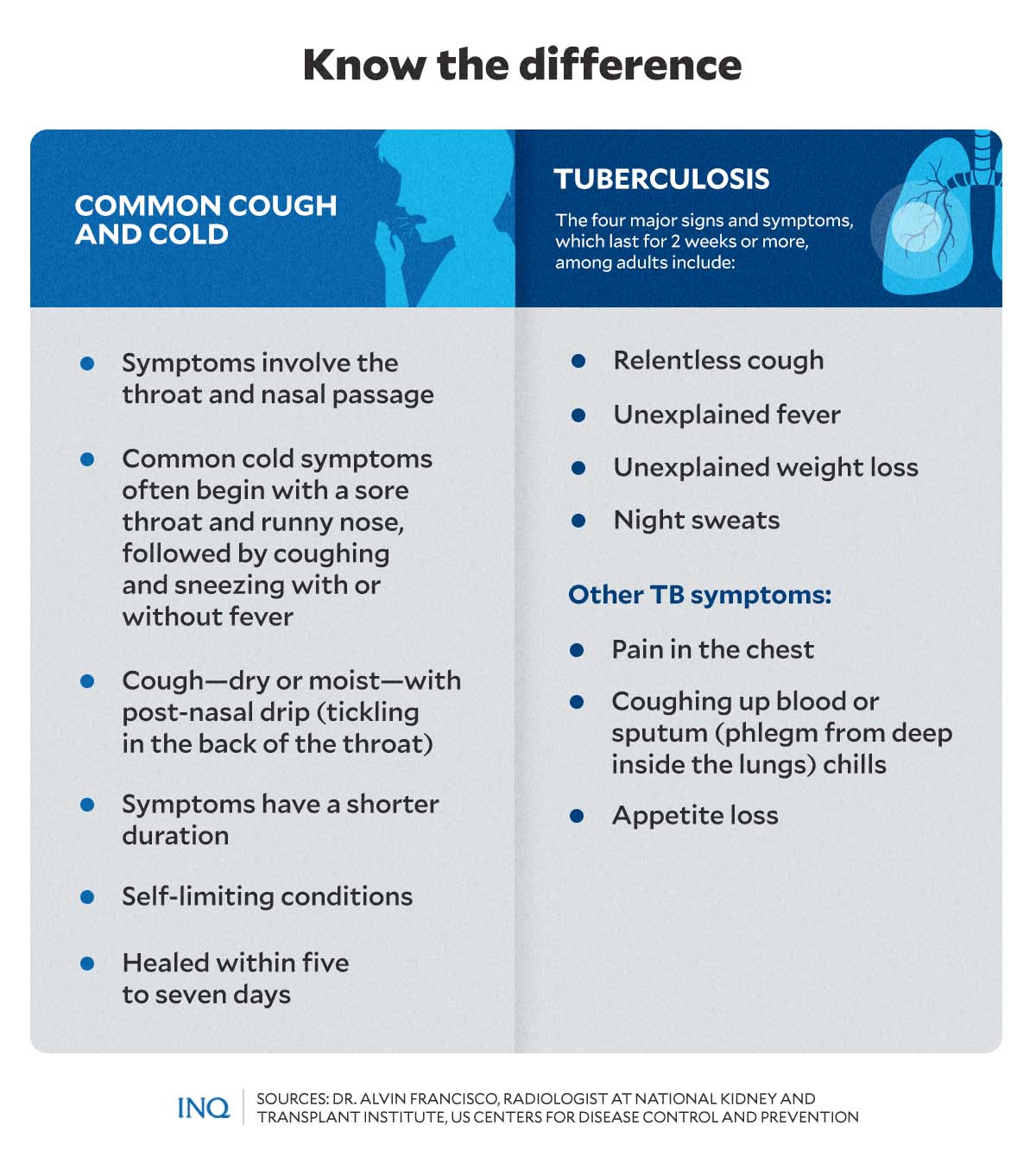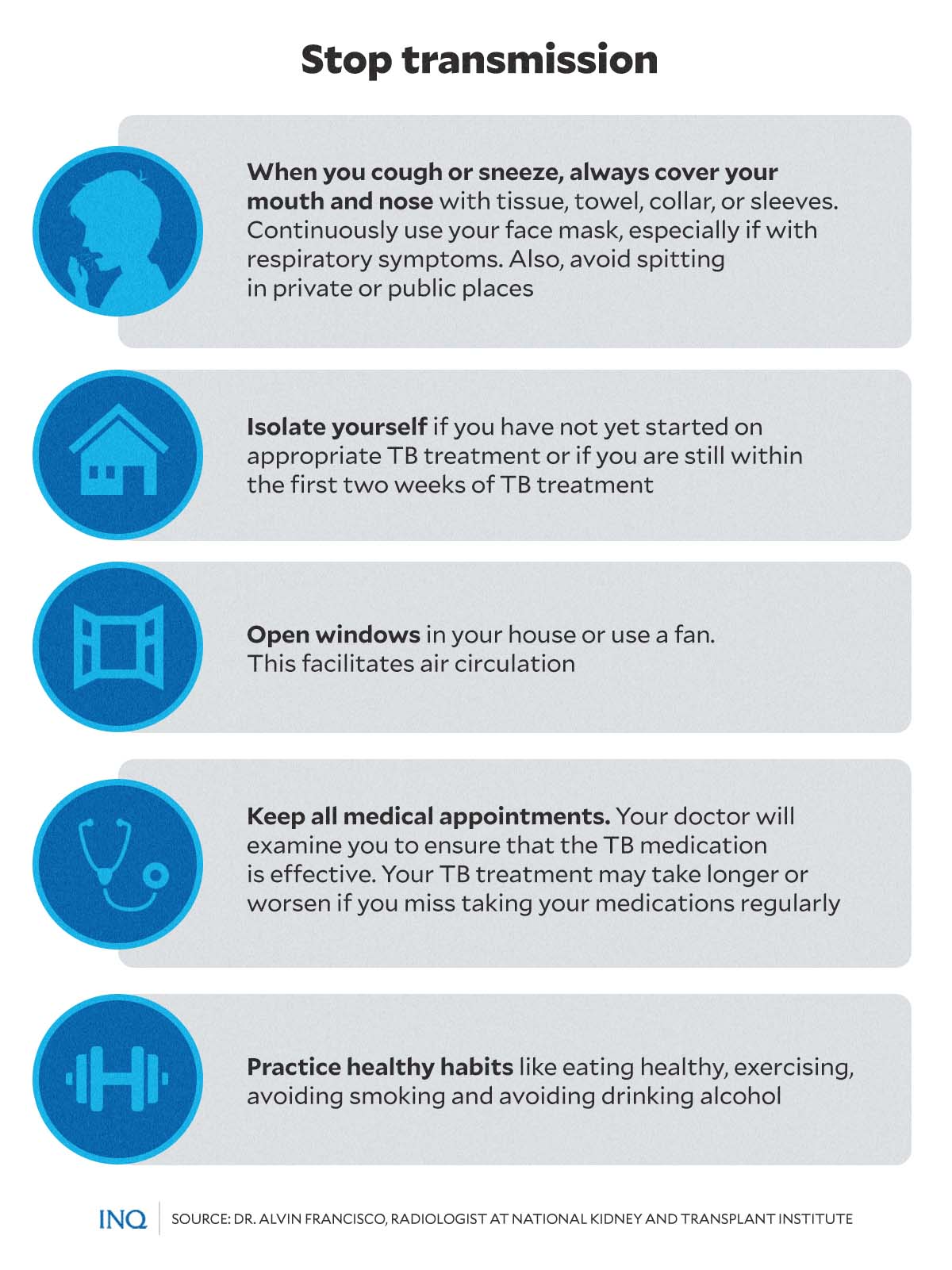Coughing? Know if it’s common or TB symptom

INQUIRER FILE PHOTO/JEROME CRISTOBAL
MANILA, Philippines—The changing weather and temperatures often trigger cough, which could be dismissed as common. However, in some cases, a simple cough could signal something more serious like tuberculosis (TB).
Coughing is a natural reflex reaction and is the body’s way to remove irritants or allergens from the upper and lower airways—or throat and lungs.
According to the US-based Mayo Clinic, an occasional cough—commonly caused by conditions like common cold and flu—is normal and often considered acute if it lasts less than three weeks.
When a cough that persists lasts longer than eight weeks and is accompanied by other symptoms, it is considered chronic and may be a sign of a medical problem. In some cases, chronic cough could indicate that a person might be suffering from diseases such as TB.
TB is a disease caused by a bacteria called “Mycobacterium tuberculosis,” which often attacks the lungs.
“TB is spread from person to person through the air. When people with lung TB cough, sneeze, or spit, they propel the TB germs into the air. A person needs to inhale only a few of these germs to become infected,” the World Health Organization (WHO) explained.
However, knowing the difference between a common cough and TB can be confusing.
Know your symptoms
According to Dr. Alvin Francisco, a radiologist at National Kidney and Transplant Institute (NKTI) in Quezon City, among the things to consider when determining whether a cough is common or TB is by observing its duration.
“TB cough usually presents at least 2 weeks or more and may even last for months, especially if untreated or no appropriate treatment for TB,” Dr. Francisco explained.
He added that TB is usually accompanied by other symptoms that might or might not be present in common coughs and colds.

GRAPHIC Ed Lustan
To distinguish between the two, Dr. Francisco noted that symptoms of common coughs and colds involve the throat and nasal passage and often begin with a sore throat and runny nose. It is then followed by coughing and sneezing with or without fever.
According to the US Centers for Disease Control and Prevention (CDC), common colds that are accompanied by coughs usually present symptoms like sore throat, runny nose, sneezing, headaches, and body aches.
On the other hand, the four major signs and symptoms of TB among adults are:
- cough
- unexplained fever
- unexplained weight loss
- night sweats
These symptoms, Dr. Francisco said, could last for two weeks or more.
WHO added that among the common symptoms of active lung TB are cough with sputum and blood at times, chest pains, and weakness.
However, the UN agency explained that TB symptoms might only be mild for months among people who develop active TB—which can cause delays in seeking care and result in the transmission of the bacteria to others.
Those with active TB can infect 5 to 15 other people through close contact over the course of a year.
TB cases, deaths
Still, the best way to determine whether a person is suffering from a common cough or TB is by getting medical attention.
Dr. Francisco said that a chest X-ray is used during the initial screening for TB. Patients will then undergo a sputum test to determine and confirm if they have TB disease.
In comparison, while chest X-rays and other tests and screening are required to diagnose TB, doctors can diagnose common cough or cold through a physical exam and history alone.
The Department of Health’s (DOH) Epidemiology Bureau recorded 26,001 cases of TB in the Philippines from January to June 2022. Of those cases, 16,290 are males, while 9,711 are females.

GRAPHIC Ed Lustan
The National Tuberculosis Control Program of the country’s health department reported a total of 340,524 cases in 2021 and 263,000 in 2020.
Unfortunately, without proper treatment, WHO said at least 45 percent of HIV-negative people with TB on average, and nearly all HIV-positive people with TB will die.
In 2021, TB was the 13th leading cause of death—and the second leading infectious killer after COVID-19—after claiming the lives of around 1.6 million people globally.
During that same year, TB was the 12th leading cause of death in the Philippines. Based on data from the Philippines Statistics Authority (PSA), a total of 12,481 people died due to TB in the country in 2021 alone.
In 2022, the disease caused the death of around 9,904 people and was the 10th leading cause of death in the country, according to PSA.
Stop transmission, take precaution
For people who are diagnosed with TB, including those who are taking medications for the disease, Dr. Francisco listed some preventive measures which could help stop the transmission of the bacteria to others:
- Cover your mouth with tissue, towel, collar, or sleeves when you cough. Always wear face masks, especially for those who have respiratory symptoms
- Avoid spitting in public
- Isolate yourself if you have not yet started on appropriate TB treatment or if you are still within the first two weeks of TB treatment
- Open windows in your house and use a fan to facilitate air circulation
- Make sure to follow up and attend all medical appointments. This will help the doctor examine you and ensure that the TB medication is effective. Missed appointments and medications may prolong your TB treatment
- Practice healthy habits such as eating healthy, exercising, avoiding smoking and drinking alcohol.
“TB is curable – as long as you take your medications every day and you religiously follow your doctor’s orders,” said Dr. Francisco.

GRAPHIC Ed Lustan
“For those who are still in denial and refuse to get tested or treated, ask and acknowledge why they don’t want to get the treatment. Then from there, educate and plan action on how to advise them.”
To know more about TB and to access an online self-assessment tool to help with TB identification and treatment, people can visit DOH’s #TBFreePH website at https://tbfree.ph/.